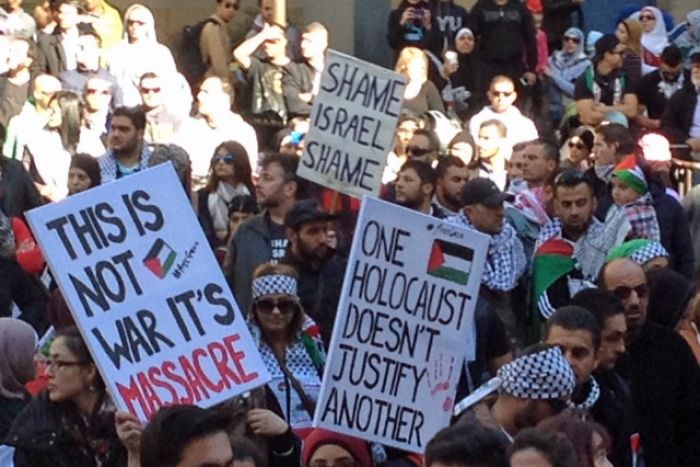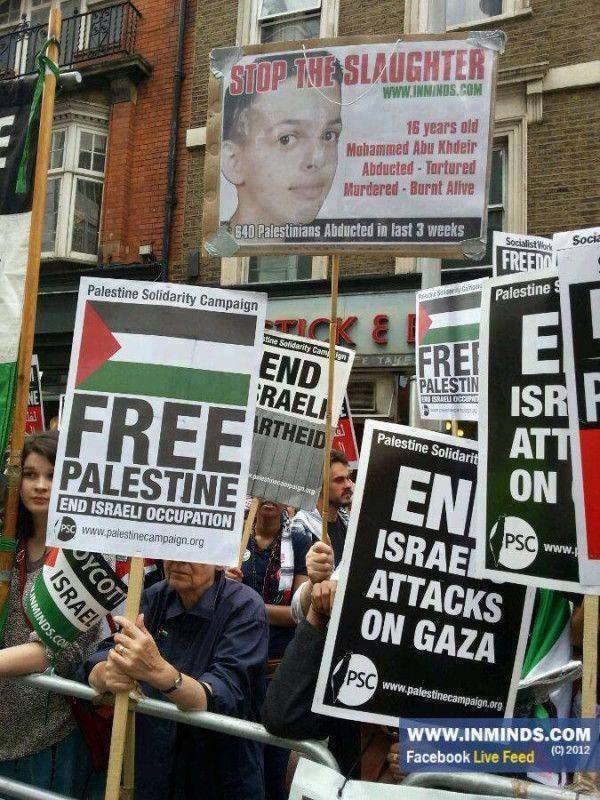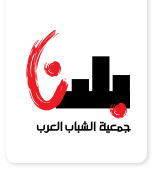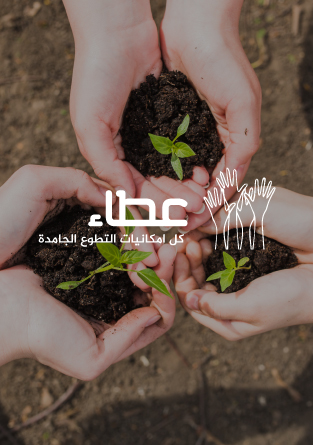Gross Human Rights and Humanitarian Law Violations and
Suspicions of War Crimes in Gaza
Since 8 July 2014, when Israel launched its air, sea and land military offensive dubbed “Operation Protective Edge”, at least 479 Palestinians have been killed in Gaza, about 75% of whom the UN humanitarian office (OCHA) report to be civilians, with upwards of 3,500 people injured.[1] The casualties have included entire families, women, children and the elderly, as Israeli air strikes have deliberately targeted homes. An estimated number of 472 homes have been totally destroyed with thousands severely damaged. Mass displacement has escalated across Gaza with upwards of 100,000 displaced, with an estimated 43% of Gaza’s territory declared as a “no-go zone”. Other civilian objects bombed by the Israeli military where civilians have been present have included a café, a hospital, an emergency medical building, a facility for the disabled, three ambulances and a clearly marked media car. Scores of schools, health facilities, mosques, and NGO offices have also been struck.
On 20 July 2014, “the deadliest day” so far, particularly grave and horrific events took place in the densely populated Shuja’iyeh area in eastern Gaza City. This area was subjected to intensive artillery shelling, airstrikes and fierce fighting on the ground. As a result, according to human rights organizations and media reports, upwards of 60 Palestinians including 17 children and 14 women were killed as well as 13 Israeli soldiers, and scores of civilians were injured. There was also widespread and systematic destruction of houses in this area by the Israeli military, thus terrorizing the population. Ambulances and medical teams could not evacuate the wounded and the dead or rescue people trapped under the rubble until a humanitarian pause entered into effect.
Thousands of rockets have also been fired indiscriminately at Israel from within the Gaza Strip, with most falling in open areas or intercepted by the Iron Dome. Two citizens of Israel - one who was distributing food to soldiers at Erez in a closed military area and the other a 32-year-old Arab Bedouin man living in an unrecognized village in the Naqab (Negev) desert - were killed.[2] As of this writing, a total of 27 Israeli soldiers have also been killed during the operation.
We strongly condemn Israel’s unlawful targeting of civilians, civilian objects, and civilian property. These acts constitute grave violations of international humanitarian law and international criminal law and may amount to war crimes and crimes against humanity under the Rome Statute. Human rights organizations in Gaza – Al Mezan and the Palestinian Centre for Human Rights - have extensively documented the most serious violations. Based on this information and sworn testimonies provided by Al Mezan, we have filed a series of complaints with the Israeli Ministry of Defense, the Military Advocate General, and the Attorney General demanding independent, genuine investigations into the circumstances of these events.
In addition to the already dire situation in Gaza due to eight years of severe closure, the current humanitarian crisis is deteriorating further. Due to the widespread destruction of civilian infrastructure and calls on the civilian population to evacuate large areas, although there is no safe place to go, there are more than 100,000 internally displaced people in shelters and with relatives; over 1.2 million people with no or very little access to water or sanitation services; 80% of the population receives electricity only four hours a day; there is a dire shortage of medicine; and tens of thousands of people require food assistance. Thus, the entire Palestinian population is being subjected to collective punishment.
The Palestinian Arab community in Israel has mobilized in protest at the horrific increase in Israeli military attacks on Gaza. Demonstrations in Israel have been met by nationalistic attacks on Arab individuals by Israeli Jewish extremists on ethnic grounds, some of whom claim that hating Arabs is not racism, it is values. The police have failed to intervene and arrest these protestors who are calling for “death to Arabs.” The security forces have used excessive force and violence against Palestinian protesters, and have conducted mass arrests and detention, including that of minors. Almost 400 Palestinian citizens of Israel have so far been arrested in the continuing protests, which started against racism and the killing of 15-year Mohammed Abu Khdeir in Jerusalem, and moved to opposition to the War in Gaza. Scores of people remain in detention.
We call on the UN Human Rights Council to:
(1) Call for an immediate end to the War, and the targeting civilian populations by all the parties;
(2) Condemn the deliberate, systematic and widespread targeting of Palestinian civilians and civilian objects in Gaza, including family homes, medical facilities, mosques, among others, as well as attacks on the water supply that constitute a grave humanitarian danger to the entire population;
(3) Call for the immediate, international protection of Palestinians in Gaza;
(4) Demand that Israel lift its blockade on Gaza, lift restrictions on freedom of movement for Palestinians and allow the passage of goods necessary for the population, and allow the resumption of economic activity in Gaza;
(5) Establish an independent, international commission of inquiry, with the mandate to identify and investigate all violations of international human rights law and international humanitarian law committed within the context of Operation Protective Edge in the Gaza Strip. This commission should set forth specific facts and circumstances of such violations and concrete recommendations with a view of holding those individuals responsible accountable, and ensuring victims access to effective remedy;
(6) Follow-up and monitor the implementation of the recommendations of the UN Fact Finding Mission on the Gaza Conflict of 2008-2009.
Signed by:
Adalah - The Legal Center for Arab Minority Rights in Israel (ECOSOC, Special)
The Arab Association for Human Rights (ECOSOC, Special)
[1] See OCHA OPT, Gaza Emergency Situation Report, 20 July 2014, 1500 hours and 21 July 2014, 1500 hours, available at: https://www.ochaopt.org/documents/ocha_opt_sitrep_21_07_2014.pdf and https://www.ochaopt.org/documents/ocha_opt_sitrep_22_07_2014.pdf; and Palestinian Ministry of Health, Gaza, 583 Palestinians killed and 3640 injured, 22 July 700 hours, available at: https://twitter.com/press221
[2] On 20 July 2014, the Israeli Supreme Court rejected a petition brought by human rights organizations calling on the state to immediately install rocket shelters in Bedouin villages. At the hearing on the case, the state argued that there is no need to provide additional protective facilities to these communities, and advised the Bedouin residents to protect themselves by lying on the ground. HCJ 5019/14, Abu Afayesh et. al.. v. the Chief of the Home Front Command, et. al, available at: https://elyon2.court.gov.il/files/14/190/050/W02/14050190.W02.htm. See also: Press Release of the Association for Civil Rights in Israel: https://www.acri.org.il/en/2014/07/20/bedouin-protection-denied/











 فاكس 8523427-04
فاكس 8523427-04